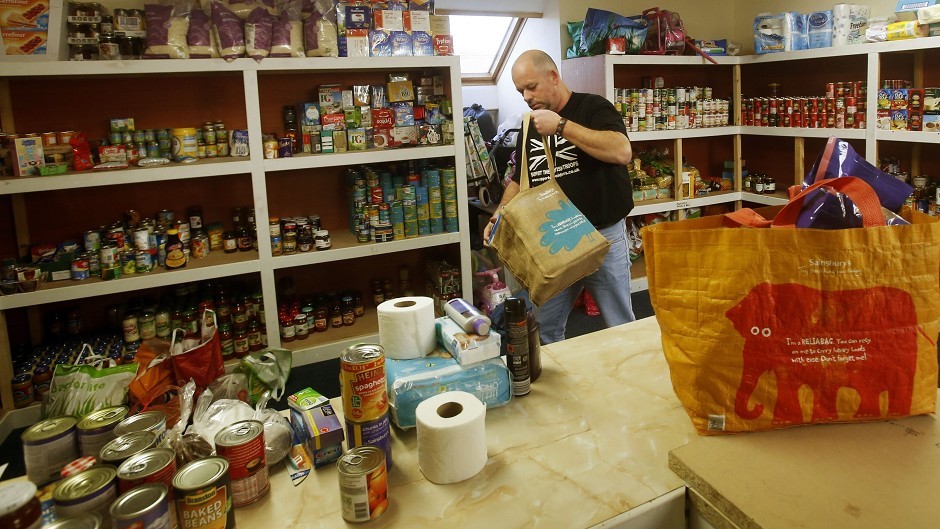The number of people using foodbanks has reached a record one million after an increase in workers on low pay having to seek emergency help for food, new figures have revealed.
The Trussell Trust said almost 400,000 children were among those receiving at least three days’ of supplies from the charity’s 445 foodbanks across the UK in the past year.
The figure doesn’t tell the true picture of the crisis, as many small charities and churches also run foodbanks or schemes for handing out food to families in need.
The Trussell Trust, which launched its first foodbank in Salisbury in 2000, said 1,084,604 people received supplies in the last financial year, an increase of 19% over the previous 12 months.
Problems with benefits were the main reason people visited foodbanks, but the Trust said there had been an increase in those on low incomes.
Foodbank managers reported dealing with people struggling with insecure work, low pay and high living costs.
Trussell Trust UK foodbank director Adrian Curtis said: “Despite welcome signs of economic recovery, hunger continues to affect significant numbers of men, women and children in the UK today.
“It’s difficult to be sure of the full extent of the problem as Trussell Trust figures don’t include people who are helped by other food charities or those who feel too ashamed to seek help.
“Trussell Trust foodbanks are increasingly hosting additional services like debt counselling and welfare advice at our foodbanks, which is helping more people out of crisis. The Trussell Trust’s latest figures highlight how vital it is that we all work to prevent and relieve hunger in the UK.”
A qualified teacher and mother of two who uses foodbanks, said: “I have an 18-month-old son and an eight-year-old stepson, I work part time as a teacher and my husband has an insecure agency contract.
“There are times when he doesn’t get enough hours of work, and we really struggle to afford food and pay the bills. The foodbank meant we could put food on the table.”
Dr John Middleton, vice president of the Faculty of Public Health said: “The rising number of families and individuals who cannot afford to buy sufficient food is a public health issue that we must not ignore.
“For many people, it is not a question of eating well and eating healthily, it is a question of not being able to afford to eat at all. UK poverty is already creating massive health issues for people today, and if we do not tackle the root causes of food poverty now we will see it affecting future generations too.
“The increased burden of managing people’s health will only increase if we do not address the drivers of people to food banks.”
Carmel McConnell, chief executive of the Magic Breakfast charity, which delivers food to schools, said the new figure for children using foodbanks was “worrying”, adding: “Magic Breakfast has seen an increase in the number of hunger-hit schools applying for urgent food deliveries, and our waiting list now stands at 270 schools, which is an all time high.
“When children start their school day hungry, they cannot concentrate and risk missing the most important lessons of the day.”
Last year the public donated 10,280 tonnes of food to foodbanks.
TUC general secretary Frances O’Grady said: “This should make all of us ashamed, particularly those who claim we have a strong economy and everyone is sharing in the recovery.”
Shadow work and pensions secretary Rachel Reeves said: “The shocking rise in the number of people relying on Trussell Trust food banks since 2010 shows the Tory plan is failing.
“David Cameron’s failure to tackle low pay, the Bedroom Tax and delays in benefit payments have led to over a million people depending on emergency food aid.
“Labour has a better plan to raise working families’ living standards so fewer people depend on food banks to survive.”
Unite general secretary Len McCluskey said: “How dare Iain Duncan Smith and David Cameron heartlessly brush off rising food bank use when all the evidence shows that their policies of benefit sanctions and austerity wages are why the hunger of so many now stalks our country.
“The inescapable truth is that on the Tory party’s watch food hunger has exploded – but as the Trussell Trust run only about a third of the nation’s food banks, this may not even be the full picture of food poverty in the UK.
“The UK is the sixth richest country on the planet so something has gone grotesquely wrong when so many people, in and out of work, have to turn to charity to feed their children.
Oxfam head of UK poverty Rachael Orr said: “It’s extremely worrying to see yet another rise in the number of people being forced to visit foodbanks in the UK.
“Whilst these figures reveal that over a million people are using Trussell Trust foodbanks, we know there are many more out there who are using independent ones, not to mention the people who don’t go to foodbanks and are literally going without enough food.
“Whoever forms the next government can’t ignore the fact that people in the seventh richest country in world are going hungry every day.”
A Conservative spokesman said: “We want a strong, balanced recovery that benefits everyone – but we will take no lectures from Ed Miliband.
He leads a party who presided over the deepest recession in living memory, whose incompetent economic policies hit the poorest harder than anyone.
“Increased use of food banks is partially because the last Labour government didn’t let Jobcentres direct people to them when they were in need of food. But of course we acknowledge there is still more to do – one family failing to make ends meet each month is a family too many.”
